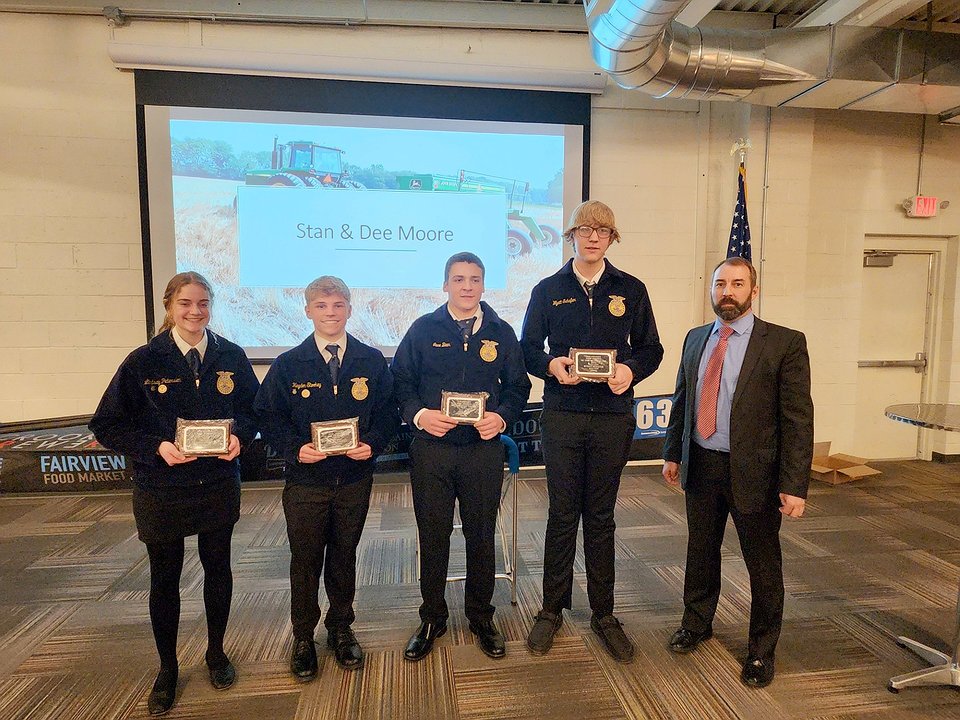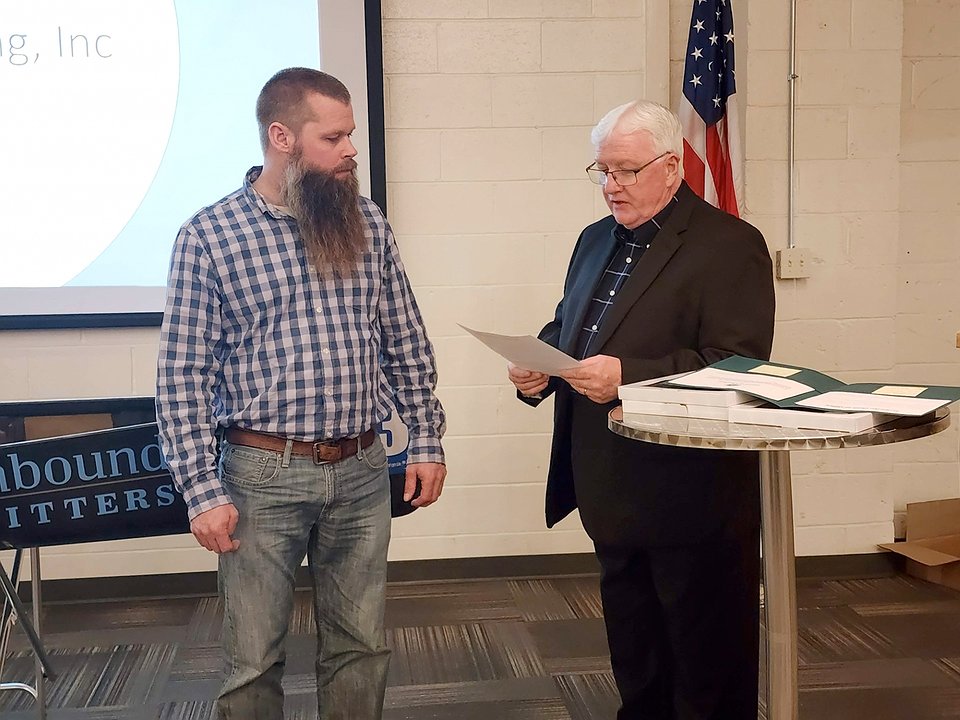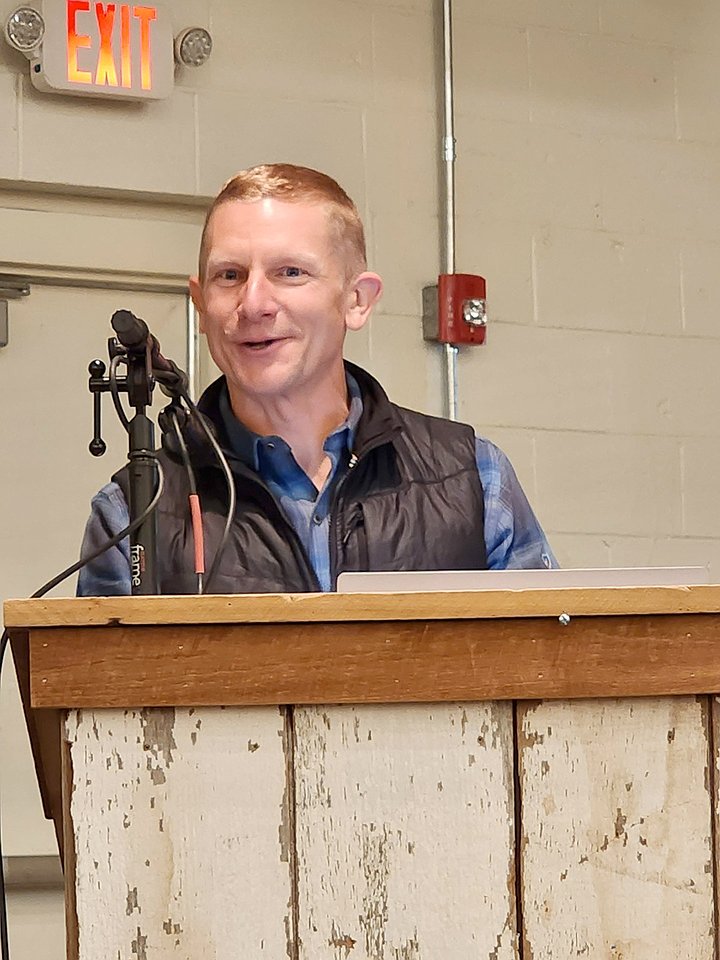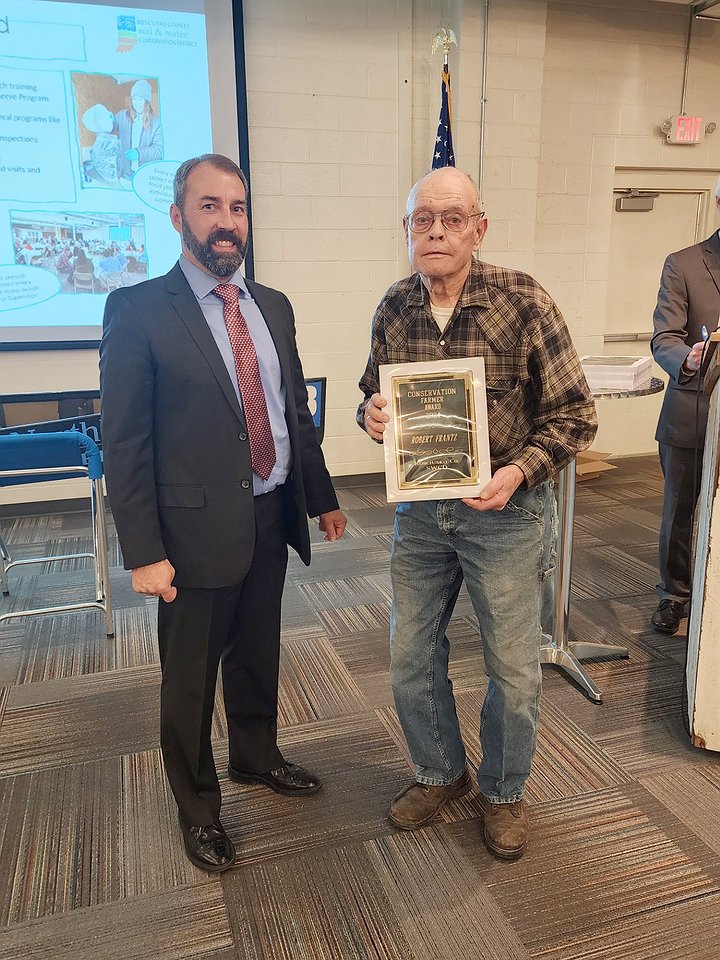Awards Presented At 67th Annual Kosciusko County SWCD Meeting
February 21, 2024 at 5:49 p.m.

Tom Parker, Robert Frantz, Dave Shively and Emily Gough, along with four high school FFA members, were recognized at the 67th annual Kosciusko County Soil and Water Conservation District meeting Tuesday.
The high school soil judging awards were presented to Hayden Stookey and Lindsay Peterson from Tippecanoe Valley and Wyatt Schafer and Jace Beer from Wawasee High School. The soil judging award recognizes four students as being the top high school soil judgers in the county in 2023.
Parker was awarded the River Friendly Farmer Award. He has implemented cover crops, no-till, nutrient management, pest management, a manure storage facility and a mortality facility on his approximately 384 acres of cropland and poultry operation. His current operation still uses many of these conservation practices to ensure continued protection of the county's and state's rivers, lakes and streams.
 Four students were recognized as being the top high school soil judgers in the county in2023 at the annual Kosciusko SWCD Annual meeting. Pictred (L to R) are Lindsay Peterson and Hayden Stookey, from Tippecanoe Valley; and Jace Beer and Wyatt Schafer, from Wawasee. Photo by Deb Patterson, InkFreeNews
Four students were recognized as being the top high school soil judgers in the county in2023 at the annual Kosciusko SWCD Annual meeting. Pictred (L to R) are Lindsay Peterson and Hayden Stookey, from Tippecanoe Valley; and Jace Beer and Wyatt Schafer, from Wawasee. Photo by Deb Patterson, InkFreeNewsFrantz was awarded the Conservation Farmer Award. He has adopted and maintained cover crops, nutrient management and no-till on his 384 acres of cropland for many years. His ongoing commitment to conservation has helped protect the county's and state's natural resources and serves as an example of good land stewardship.
Shively was presented the Environmental Enhancement Award. He has established over 100 acres of wildlife habitat on his properties. Practices include tree plantings, pollinator planting, food plots and wetland restorations. These practices provide both water quality and wildlife habitat. He actively manages his property to eliminate invasive species and maintain high quality habitat for wildlife.
Gough, Warsaw Community High School environmental science teacher, was presented the Conservation Teacher of the Year Award. This award celebrates the dedication and commitment of educators who go above and beyond to instill a deep appreciation for the natural world in students. She was recognized for her outstanding contributions to environmental education.
Additionally, Luke Mullet was elected to the SWCD board for a three-year term. Mullet will replace Jamie Scott.
Matt Meersman, who leads the St. Joseph River Basin Commission, was the guest speaker. While he touched briefly on his position on the commission, the focus of his presentation was on his second profession as a competitive canoe racer.
Meersman, who won the Ausable Canoe Race from Grayling, Mich., to Oscoda, Mich., in 2021 and holds the current race record of 13 hours, 54 minutes, 9 seconds, spoke of his passion.
“I’m gonna try to put work on the back burner and talk to you about me and my real passion, which is this crazy sport of canoe racing,” stated Meersman.
 Luke Mullet (L) is shown taking the oath of office as the newly elected supervisor for Kosciusko SWCD. He was elected for a three-year term, replacing Jamie Scott, whose term has expired. Mullet was given the oath of office by Bob Conley, Kosciusko County commissioner. Photo by Deb Patterson, InkFreeNews
Luke Mullet (L) is shown taking the oath of office as the newly elected supervisor for Kosciusko SWCD. He was elected for a three-year term, replacing Jamie Scott, whose term has expired. Mullet was given the oath of office by Bob Conley, Kosciusko County commissioner. Photo by Deb Patterson, InkFreeNews“Most people have never heard of such a thing. The idea of getting in a canoe and paddling 70 strokes a minute for hours on end sounds completely insane to most people,” he said.
He talked of how he entered into that realm and why he appreciated it so much. He displayed a graphic of all the land that drains into the St. Joseph River of Lake Michigan. This area, which he serves for work, has “also become my playground,” he stated.
Meersman stated canoe racing has changed his life and unleashed exciting things. He grew up near the St. Joe river, ”I always loved playing outside. The river was always fascinating to me.”
He noted the joy of growing up around water, taking up hiking and being exposed to recreational canoeing. He found “paddling has a way to get outside, adventure and explore wide places.”
He entered his first race, believing it was going down the river. These races are up river. He started training at 5-5:30 each morning. By the third day he was hooked, “it was starting my day on the water ... sun coming up, birds and the turtles, all the things that attracted me to going out there in the first place.
“It’s just become a lifestyle, getting out there and moving through space. ... What’s this have to do with conservation?” Meersman noted the sustainability, resilience, extending resources, all of which is what conservation is about.
He shed some light on the race itself, which starts at night, goes for 120 miles and usually last 14-15 hours. There are pit crews who wade into the river out to the canoeists to provide nourishment every two hours.
Meersman, who had his carbon fiber canoe and paddles displayed, noted while there is a large purse for the winners, it is not a lucrative sport. He indicated a 20th place finisher may receive $500.
Additionally, he stated how the sport has taken him to far-flung places and his experiences in races in Hawaii and Puerto Rico. In one Hawaiian solo race, he placed 35th or 40th out of 100 participants.
Meersman and his partner won the 2021 Ausable Canoe Race and tried to defend their title in 2022, but came in third. Their goal is to try to win the race again.
He did speak briefly about his position. “We’re trying to improve or protect water quality and reduce damages to land from flooding ... if you care about the lake/water, you have to think about the land that’s draining to that water, you can’t fix the problem of the lake just tinkering around the lake. ...”
He noted there is a disconnection that occurs that land and water is separate. “There is no separation between land and the water, when it comes to its character, how it behaves, its exactly a representation what is going on the land.
“What I do for work ... try to work with local governments ... health department, SWCD, county surveyors ... all these touch water. We try to work on improving the management, coordinating planning ... mostly monitoring and studying the resources to hopefully make better more informed decision about our resources.”
Tom Parker, Robert Frantz, Dave Shively and Emily Gough, along with four high school FFA members, were recognized at the 67th annual Kosciusko County Soil and Water Conservation District meeting Tuesday.
The high school soil judging awards were presented to Hayden Stookey and Lindsay Peterson from Tippecanoe Valley and Wyatt Schafer and Jace Beer from Wawasee High School. The soil judging award recognizes four students as being the top high school soil judgers in the county in 2023.
Parker was awarded the River Friendly Farmer Award. He has implemented cover crops, no-till, nutrient management, pest management, a manure storage facility and a mortality facility on his approximately 384 acres of cropland and poultry operation. His current operation still uses many of these conservation practices to ensure continued protection of the county's and state's rivers, lakes and streams.
 Four students were recognized as being the top high school soil judgers in the county in2023 at the annual Kosciusko SWCD Annual meeting. Pictred (L to R) are Lindsay Peterson and Hayden Stookey, from Tippecanoe Valley; and Jace Beer and Wyatt Schafer, from Wawasee. Photo by Deb Patterson, InkFreeNews
Four students were recognized as being the top high school soil judgers in the county in2023 at the annual Kosciusko SWCD Annual meeting. Pictred (L to R) are Lindsay Peterson and Hayden Stookey, from Tippecanoe Valley; and Jace Beer and Wyatt Schafer, from Wawasee. Photo by Deb Patterson, InkFreeNewsFrantz was awarded the Conservation Farmer Award. He has adopted and maintained cover crops, nutrient management and no-till on his 384 acres of cropland for many years. His ongoing commitment to conservation has helped protect the county's and state's natural resources and serves as an example of good land stewardship.
Shively was presented the Environmental Enhancement Award. He has established over 100 acres of wildlife habitat on his properties. Practices include tree plantings, pollinator planting, food plots and wetland restorations. These practices provide both water quality and wildlife habitat. He actively manages his property to eliminate invasive species and maintain high quality habitat for wildlife.
Gough, Warsaw Community High School environmental science teacher, was presented the Conservation Teacher of the Year Award. This award celebrates the dedication and commitment of educators who go above and beyond to instill a deep appreciation for the natural world in students. She was recognized for her outstanding contributions to environmental education.
Additionally, Luke Mullet was elected to the SWCD board for a three-year term. Mullet will replace Jamie Scott.
Matt Meersman, who leads the St. Joseph River Basin Commission, was the guest speaker. While he touched briefly on his position on the commission, the focus of his presentation was on his second profession as a competitive canoe racer.
Meersman, who won the Ausable Canoe Race from Grayling, Mich., to Oscoda, Mich., in 2021 and holds the current race record of 13 hours, 54 minutes, 9 seconds, spoke of his passion.
“I’m gonna try to put work on the back burner and talk to you about me and my real passion, which is this crazy sport of canoe racing,” stated Meersman.
 Luke Mullet (L) is shown taking the oath of office as the newly elected supervisor for Kosciusko SWCD. He was elected for a three-year term, replacing Jamie Scott, whose term has expired. Mullet was given the oath of office by Bob Conley, Kosciusko County commissioner. Photo by Deb Patterson, InkFreeNews
Luke Mullet (L) is shown taking the oath of office as the newly elected supervisor for Kosciusko SWCD. He was elected for a three-year term, replacing Jamie Scott, whose term has expired. Mullet was given the oath of office by Bob Conley, Kosciusko County commissioner. Photo by Deb Patterson, InkFreeNews“Most people have never heard of such a thing. The idea of getting in a canoe and paddling 70 strokes a minute for hours on end sounds completely insane to most people,” he said.
He talked of how he entered into that realm and why he appreciated it so much. He displayed a graphic of all the land that drains into the St. Joseph River of Lake Michigan. This area, which he serves for work, has “also become my playground,” he stated.
Meersman stated canoe racing has changed his life and unleashed exciting things. He grew up near the St. Joe river, ”I always loved playing outside. The river was always fascinating to me.”
He noted the joy of growing up around water, taking up hiking and being exposed to recreational canoeing. He found “paddling has a way to get outside, adventure and explore wide places.”
He entered his first race, believing it was going down the river. These races are up river. He started training at 5-5:30 each morning. By the third day he was hooked, “it was starting my day on the water ... sun coming up, birds and the turtles, all the things that attracted me to going out there in the first place.
“It’s just become a lifestyle, getting out there and moving through space. ... What’s this have to do with conservation?” Meersman noted the sustainability, resilience, extending resources, all of which is what conservation is about.
He shed some light on the race itself, which starts at night, goes for 120 miles and usually last 14-15 hours. There are pit crews who wade into the river out to the canoeists to provide nourishment every two hours.
Meersman, who had his carbon fiber canoe and paddles displayed, noted while there is a large purse for the winners, it is not a lucrative sport. He indicated a 20th place finisher may receive $500.
Additionally, he stated how the sport has taken him to far-flung places and his experiences in races in Hawaii and Puerto Rico. In one Hawaiian solo race, he placed 35th or 40th out of 100 participants.
Meersman and his partner won the 2021 Ausable Canoe Race and tried to defend their title in 2022, but came in third. Their goal is to try to win the race again.
He did speak briefly about his position. “We’re trying to improve or protect water quality and reduce damages to land from flooding ... if you care about the lake/water, you have to think about the land that’s draining to that water, you can’t fix the problem of the lake just tinkering around the lake. ...”
He noted there is a disconnection that occurs that land and water is separate. “There is no separation between land and the water, when it comes to its character, how it behaves, its exactly a representation what is going on the land.
“What I do for work ... try to work with local governments ... health department, SWCD, county surveyors ... all these touch water. We try to work on improving the management, coordinating planning ... mostly monitoring and studying the resources to hopefully make better more informed decision about our resources.”



